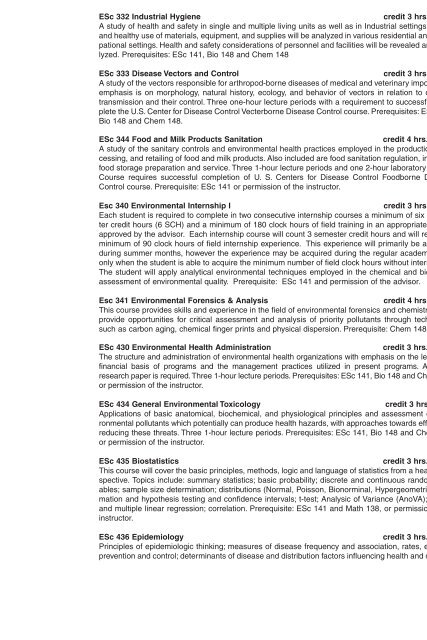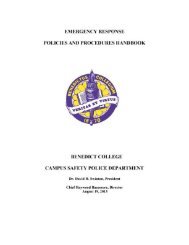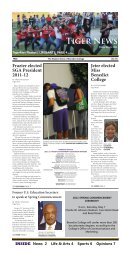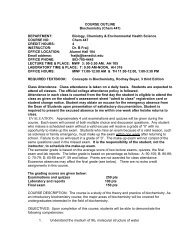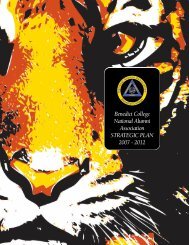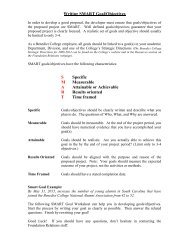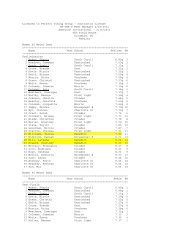2009-2011 - Benedict College
2009-2011 - Benedict College
2009-2011 - Benedict College
Create successful ePaper yourself
Turn your PDF publications into a flip-book with our unique Google optimized e-Paper software.
SCIENCE, TECHNOLOGY AND ENGINEERING DEPARTMENT 223<br />
ESc 332 Industrial Hygiene<br />
credit 3 hrs.<br />
A study of health and safety in single and multiple living units as well as in Industrial settings. Safety<br />
and healthy use of materials, equipment, and supplies will be analyzed in various residential and occupational<br />
settings. Health and safety considerations of personnel and facilities will be revealed and analyzed.<br />
Prerequisites: ESc 141, Bio 148 and Chem 148<br />
ESc 333 Disease Vectors and Control<br />
credit 3 hrs.<br />
A study of the vectors responsible for arthropod-borne diseases of medical and veterinary importance;<br />
emphasis is on morphology, natural history, ecology, and behavior of vectors in relation to disease<br />
transmission and their control. Three one-hour lecture periods with a requirement to successful complete<br />
the U.S. Center for Disease Control Vecterborne Disease Control course. Prerequisites: ESc 141,<br />
Bio 148 and Chem 148.<br />
ESc 344 Food and Milk Products Sanitation<br />
credit 4 hrs.<br />
A study of the sanitary controls and environmental health practices employed in the production, processing,<br />
and retailing of food and milk products. Also included are food sanitation regulation, involving<br />
food storage preparation and service. Three 1-hour lecture periods and one 2-hour laboratory period.<br />
Course requires successful completion of U. S. Centers for Disease Control Foodborne Disease<br />
Control course. Prerequisite: ESc 141 or permission of the instructor.<br />
Esc 340 Environmental Internship I<br />
credit 3 hrs<br />
Each student is required to complete in two consecutive internship courses a minimum of six semester<br />
credit hours (6 SCH) and a minimum of 180 clock hours of field training in an appropriate setting<br />
approved by the advisor. Each internship course will count 3 semester credit hours and will require a<br />
minimum of 90 clock hours of field internship experience. This experience will primarily be acquired<br />
during summer months, however the experience may be acquired during the regular academic term<br />
only when the student is able to acquire the minimum number of field clock hours without interruption.<br />
The student will apply analytical environmental techniques employed in the chemical and biological<br />
assessment of environmental quality. Prerequisite: ESc 141 and permission of the advisor.<br />
Esc 341 Environmental Forensics & Analysis<br />
credit 4 hrs<br />
This course provides skills and experience in the field of environmental forensics and chemistry. It will<br />
provide opportunities for critical assessment and analysis of priority pollutants through techniques<br />
such as carbon aging, chemical finger prints and physical dispersion. Prerequisite: Chem 148.<br />
ESc 430 Environmental Health Administration<br />
credit 3 hrs.<br />
The structure and administration of environmental health organizations with emphasis on the legal and<br />
financial basis of programs and the management practices utilized in present programs. A senior<br />
research paper is required. Three 1-hour lecture periods. Prerequisites: ESc 141, Bio 148 and Chem 148<br />
or permission of the instructor.<br />
ESc 434 General Environmental Toxicology<br />
credit 3 hrs.<br />
Applications of basic anatomical, biochemical, and physiological principles and assessment of environmental<br />
pollutants which potentially can produce health hazards, with approaches towards effectively<br />
reducing these threats. Three 1-hour lecture periods. Prerequisites: ESc 141, Bio 148 and Chem 148<br />
or permission of the instructor.<br />
ESc 435 Biostatistics<br />
credit 3 hrs.<br />
This course will cover the basic principles, methods, logic and language of statistics from a health perspective.<br />
Topics include: summary statistics; basic probability; discrete and continuous random variables;<br />
sample size determination; distributions (Normal, Poisson, Bionorminal, Hypergeometric); estimation<br />
and hypothesis testing and confidence intervals; t-test; Analysic of Variance (AnoVA); simple<br />
and multiple linear regression; correlation. Prerequisite: ESc 141 and Math 138, or permissionof the<br />
instructor.<br />
ESc 436 Epidemiology<br />
credit 3 hrs.<br />
Principles of epidemiologic thinking; measures of disease frequency and association, rates, etiology,<br />
prevention and control; determinants of disease and distribution factors influencing health and disease


